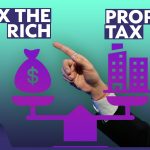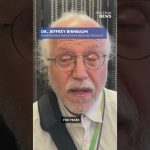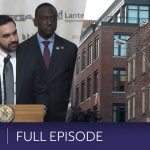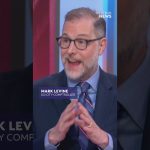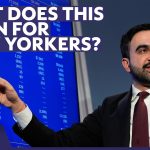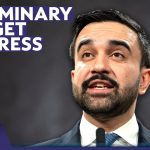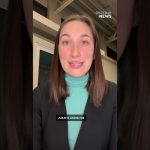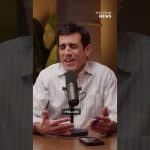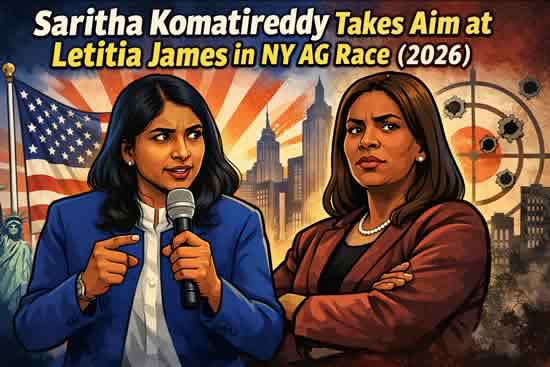In a wide-ranging interview on Pod Force One with Miranda Devine, New York City Mayor Eric Adams offered a robust defense of his administration as he enters a tough re-election fight. While still identifying as a Democrat, Adams said his “Safe and Affordable” platform reflects a break from the party’s progressive wing, which he claims has abandoned working-class concerns. He touted declines in major crimes, efforts to address the migrant crisis, and initiatives targeting quality-of-life issues, while blaming state laws and federal inaction for persistent challenges. Adams dismissed rivals including Andrew Cuomo and Zohran Mamdani as lacking either credibility or realism, and attributed past legal scrutiny to political retaliation. Personal anecdotes—from a troubled childhood marked by poverty and police abuse to his eventual path through the NYPD and City Hall—underscored his recurring theme: resilience over perfection, and governance grounded in lived experience, not ideology.
Transcript: Mayor Adams Appears on “Pod Force One With Miranda Devine”
Miranda Devine: Welcome back to the Pod Force One podcast. We’re in New York City in Gracie Mansion in the Peach Room. This is the home of Mayor Eric Adams who we’re going to be speaking to. He’s locked in an intense race for re-election.
Mayor Adams, thank you so much for talking to us here on Pod Force One. You are in for the race of your life for re-election later in the year. And I know you used to be a Democrat, very proud Democrat. What made you leave the party and become an independent?
Mayor Eric Adams: Yeah, and I’m still a Democrat, but the rules allow us to run on Independent lines. And so I’m a Democrat running on an Independent line called Safe and Affordable, two of the top issues that New York is facing. But it is clear that a portion of our party has taken a far left approach to governing, and I don’t support those concepts. And I like to say that it’s not so much I left the party, but the party left me.
Devine: Why did that happen? What’s gone wrong with the Democratic party?
Mayor Adams: What I believe is the issue is that we are allowing a numerical minority that is the loudest to hijack the needs of working class people and what working class people are concerned about. They’re concerned about ensuring that they could afford to live in their city.
They’re concerned about the city being safe, and they’re concerned about making sure that they can see a bright future. And these other conversations that they’re having are not really the bread and butter issues of working class people.
Devine: And who do you see as your biggest or strongest adversary? We have Andrew Cuomo, the former governor. I call him the granny killer because of his policies during COVID. And he also was responsible for bail reform that I think’s been very difficult for increasing crime in the city.
And then you have Zohran Mamdani, who is the far left Democrat, who just won the primary. And then you have the Republican Curtis Sliwa. So of those three, who do you see as the most difficult to beat?
Mayor Adams: Well, I’m a firm believer when I ran in 2021, we had an impressive slate of people. And then we had a national figure, Andrew Yang came into the race. And he was beating me by about 13 points. In addition to that, I was losing from his candidacy that many people thought it was inevitable that he was going to win. But I knew I had to stay focused and do what I do best. And that is to explain to New Yorkers why I was the best candidate. And I think I’m here in that same place now.
We were, our entire administration, with all of our success, we were overshadowed by what I consider to be lawfare during the federal investigation. And now that that’s behind us and not coming back, it’s giving me the opportunity to speak directly to voters on our success. And so when I look at the candidates that are in the race, one has no record. The other is running away from his record, such as bail reform of 15,000 of our seniors who died in nursing homes and other issues.
And Curtis has never held office before, and he doesn’t have any real record. So I don’t see them as an obstacle. The obstacle I will always have is ensuring I can speak directly to voters. And that is what we’re going to do and share my vision for the future and the success that we’ve had in the last three and a half years.
Devine: So take Mamdani, you and him could not be really more different. What is it about, you know, what if he did become mayor, what would his policies do to the city?
Mayor Adams: Well, you would have to peel back each one of them because they would impact a part of the city severely and each one would be different, such as he wants to empty out Rikers Island. After bail reform, the most dangerous people in our city are now on Rikers Island, around 7,400. If he empties out Rikers Island, those dangerous people are going to go back into the communities that they inflicted violence in in the first place. And they’re largely Black and brown communities.
So the individuals he’s stating he wants to help, he’s actually hurting. If you look at his government to supermarket program, that is going to impact my supermarkets, my grocery stores, my local mom and pop stores, which many of them are former immigrant communities that are now trying to pursue the American dream. And they invest all that they have in these supermarkets. It’s a major impact on these communities.
And even if you look at the call to freeze rent, no rent increase, he was first part of the population that was saying no rent at all during COVID. Now he’s saying freeze rent. My 700,000 small property owners and many that have small rental buildings, they will be impacted. If the cost of running a building is higher than the rent roll of the building, then you’re going to eventually see a lack of repairs, lack of quality of life. And again, that is going to hurt low income New Yorkers.
So each one of his policies, including the free bus, which has become popular, it sounds good, but it costs $3 billion. And mayors don’t have the ability to raise income tax. He stated he’s going to raise income tax on the high 1 percent of New Yorkers. When at the same time, he’s saying that billionaires should not be in our city. So he can raise the income taxes. So he’s making these false promises.
And so I truly believe the worst thing you can do when New Yorkers are struggling is to make broken promises. I saw that as a child when my mother was raising six children. Oftentimes she would get those broken promises never to resolve the issues we were facing. And that is what he’s doing. And I think it’s unfair to New Yorkers and it’s unfair to the direction that the city is moving in now. And it is in the right direction.
Devine: That’s a very moving statement that you just made about broken promises and your childhood. Can we go back to– you had a difficult childhood. Obviously your mother was amazing, but your father was in and out of your life and he had some addiction problems, didn’t he? Describe what it was like growing up and how you managed to escape a difficult upbringing like that.
Mayor Adams: Well, one is the power of God and the power of prayer. I’m a person of deep faith. It was six of us. I had five siblings and my oldest sister played the role of raising us. And when you think about poverty impacts the quality of life of children. My sister did not have a childhood because she played the role of our mom while my mother was working three jobs. And she was dedicated and committed.
I struggled from dyslexia as a child, undiagnosed. So I did not realize that I felt I was dumb instead of just that I learned differently. And once I discovered I was able to excel in school, but it was a major impact. And it was traumatic as a young child growing up, not receiving the services that I deserve. And then you look at the quality of food that we were consuming.
It played a role in long-term health care issues that we faced, but mother was determined. And I think that’s why I got my resiliency that no matter what you go through, you have to push through. Mother got up every day. She knew she had an obligation of a small, modest house and six children. She did those three jobs. I never heard her complain. She would do morning at the Amsterdam Day Care Center.
She was there for many years as a cook and a head cook. And then she would go on in the afternoon and clean the houses of people. And during the overnight evening hours, she would go and clean offices after they closed. And she would do it five and sometimes six days a week, but never gave up, never surrendered and always remained committed to doing the best she could possibly do for her six children.
Devine: What an amazing woman she must have been.
Mayor Adams: Oh, she was.
Devine: Yeah. And your father, what was your relationship like with him?
Mayor Adams: He had a good heart, but he [just] wasn’t a good father. He had an alcohol abuse from time to time. He would come in and out of the family, sometimes just leaving for weeks at a time. We would communicate often throughout the time, but those basic needs that a father should be there and present, it was just not there. And it was not that he was a mean spirited person. He was just not the person that should have been in the role of raising six children.
Devine: And what effect did that have on you? I know you said you struggled at school a little bit at the beginning, and you were obviously highly intelligent because you ended up overcoming dyslexia and doing so well. But I know you were a bit naughty and you ended up on the streets for a while.
Mayor Adams: Yes. And, you know, when you have a learning disability, you ask yourself a question, why do you have to go to school at all? And that’s what started to happen to me. When I walked into the classroom, I would see a sign on the back of the chair saying, “dumb student.” [They] just constantly mocked me. If I read, the children would mock me throughout the day. And, you know, children are cute, but they can be ugly.
Devine: Yes, cruel.
Mayor Adams: And it impacts you as a child. And so I started spending time in the streets. My brother and I, at 15, we were arrested for criminal trespassing. And the police officers, for no reason, assaulted us during that encounter. And it just had a negative impact on me for some time. But, sometimes painful moments become growing moments. And a civil rights leader named Reverend Herbert Daughtry encouraged me to go into the Police Department.
And it was one of the best decisions that I could have made, not realizing that demon inside of me, if I went inside the agency, that created that painful moment and became an activist for public safety, but reforming in Police Departments. And I started an organization while I was in the Police Department, and it allowed me to really push for proper policing, but also to deal with proper public safety.
And it was just a therapeutic moment for me because it allowed me to get rid of that pain and anger that I was feeling from being a 15 year old that was abused by police officers.
Devine: So tell me about the moment that you were arrested and the police abused you. I think you were hanging out with a gang at the time.
Mayor Adams: Yes. During that time, there was a gang called Seven Crowns and Savage Skulls. Those were two street gangs. They were well known in South Jamaica, Queens. And from time to time, I was affiliated and I would be hanging out with them. Negative influences, if you don’t have positive influences around you, you’re going the wrong road and wrong direction.
And I bet you, I don’t have any scientific data, but I bet you the overwhelming number of those young boys that were in the gang, I bet you they had learning disabilities. So it was probably just a gang of individuals with undiagnosed learning disabilities. Because when you look at our jails, 30 to 40 percent of the inmates have learning disabilities.
And so this is probably an accumulation of those who abandoned traditional education and thought that we had to educate ourselves. And so it was a gang that was involved in everything from selling marijuana to running illegal numbers and just doing mischief. And when the police officer arrested my brother and I, it was for criminal trespassing. We went into an apartment of a person that we knew and we took items out of there. And eventually we were charged with criminal trespassing when I was coming home from school one day.
Devine: And how did the cops treat you?
Mayor Adams: When you arrest someone, you have to fill out paperwork. I learned later what that paperwork actually was. They said they were filling out the paperwork, processing our arrest. And out of nowhere, they said, “Do you feel like a beatdown?” I did not know what they were talking about. And they took my brother and I down to the basement of the 103rd precinct and they just kicked us in our groin over and over again.
And it was not only a physical painful moment, it was an emotional painful moment because you felt demasculated at the time. And for about a week, we were urinating blood, never told our mother. He and I didn’t even talk about it until we were late into our adulthood. We sat down and we reflected on it. But it was a challenging time.
And I relived it every time I saw a police car, every time I saw a police show, every time I would hear a siren, you relive that trauma. And that only stopped after I went into the Police Department and felt as though I was fighting on behalf of people being safe, but making sure the right men and women were police officers.
Devine: You came in just a few years before Rudy Giuliani was made mayor. And then he, of course, had the broken windows, tough on crime. The city, I lived pre-Giuliani here. And it was an awful, scary place. And so from a citizen point of view, Giuliani did a great job, but you saw it slightly differently, didn’t you, at the time?
Mayor Adams: Right. I’m a believer in using the theory of not allowing small issues to grow into major issues. I think that what Giuliani did at the time, he brought in Bill Bratton, who was one of the smartest tacticians around public safety. And Bratton brought in that theory of broken windows. It was a theory that was used in other parts of the country.
He also brought in the theory of COMPStat, of becoming more predictable in fighting crime. Once we got to the levels that we needed, we started to go too far. We started using what was called Stop, Question, and Frisk. We were starting to use it as a quota. We were requiring officers to have a certain number of Stop, Question, and Frisk. This is interacting with the public and determining if someone is carrying a weapon or if they’re committing a crime.
We started going too far with it. That went into what my whole beliefs were. We not only must deal with public safety, but we have to deal with justice. We have to have proper policing without public safety. I was a big believer in going after those minor quality of life infractions, but I was not a believer in using a quota system that no matter what a person was doing in a particular community, we would Stop and Frisk them.
That was wrong and I advocated against that, but I will always advocate in favor of catching those who are committing illegal behavior because that was the reason I went into policing. I wanted proper policing with those officers who could do the job from the days of being abused, but I also saw in my communities individuals who were victims of crime. I wanted to make sure our city was safe. That was a duality that I experienced as a police officer.
Devine: I suppose it’s a duality that you experience now as mayor. I lived through the de Blasio years as well, which really went downhill. There’s a notable difference since you came in, in terms of it doesn’t feel so scary on the streets. It doesn’t seem like there are so many crazy homeless people running rampant.
That’s great, but it hasn’t been as big a difference as in Giuliani’s time. Tell me about crime. You’ve made it a big focus and I think you’ve had some good news on shootings and murder, but on quality of life, theft and so on, not such good news.
Mayor Adams: Actually, the only real nagging issue we have is felony assaults. We’re seeing an increase in assaults on police officers, domestic violence, and other random acts of violence, which is very important. We really want to crack down on those. Why do you think that’s happening? I don’t have any scientific data, but I think COVID was a dark place for many people.
Coming out of COVID, people really expressed their anger by violence. We lost a lot of loved ones. It was a very traumatic moment for many people. I’m pretty sure if we look back on this time, we’re going to see that COVID, many people did not get the necessary therapy that they deserve. Many people are dealing with pain. I lost several good friends during COVID. I still feel the pain of their loss because it happened so rapidly in such a short period of time. I think COVID has a lot to do with some of the issues that we’re facing right now.
Then, I believe that we are living our lives through social media. Our loved ones and our family members, they stay on social media. You just see so much violence on social media, and you see just a quick, knee-jerk response to whatever angers you. When you do a combination of the time we spend in violent environments, from video games to looking at the screenshots, I think people are just responding in a very knee-jerk reaction. It creates this level of violence.
Then, the high level of disrespect that we’re showing for law enforcement. We’re seeing it all over our country in general, but specifically here in New York. There are many people that don’t respect law enforcement, and we’re seeing that increase in assaults on police officers. The goal is to crack down on that.
When you look at overall, we’re seeing impressive decreases in what they call the seven major crimes. That is how you indicate the safety of the city. We’re the safest big city in America. We’re witnessing drops in robberies and grand larcenies. People are– stealing items, grand larceny, auto. We’re seeing drops in our homicides, our shootings. We have the lowest number of homicides and shootings in a recorded history of the city in the last six months. That just says a lot.
Devine: How did you do that? Did you focus on that in particular?
Mayor Adams: That’s a great question. We were able to do it in spite of the City Council laws that we believe have harmed our ability to allow police officers to do their job, in spite of the bail reform, in spite of something called Raise the Age, where we have stopped treating 16-year-olds that commit violent crimes as adults.
With all of these legislative changes, we have been able to still bring down crime because we focused on those areas. We created hotspots in the city where we knew there was traditional violent behavior. We put in place a gun enforcement unit that assisted us in removing 22,000 illegal guns off our streets. We zeroed in on some of the behaviors that are associated with violence by closing illegal cannabis stores so that they won’t be an attraction to violent people, going after people who rode illegal scooters.
They were using it to snatch and grab jewelry and phones and watches and to do robberies. We had a holistic approach that we knew if we took guns off the streets, we would see a decrease in shooting because you can’t commit a shooting if you don’t have a gun. That is why we focused on it, and the plan clearly shows that it is working.
Devine: I think you’ve got a plan that you’re rolling out right about now on quality of life.
Mayor Adams: Yes, we call it the Q-teams, and it is going after the quality of life issues. We were successful in bringing down crime statistically, but people weren’t feeling safe. They weren’t feeling safe because we saw abandoned vehicles, people just totally not following the basic rules, illegal dumping, all of these things.
Devine: Urinating in the street.
Mayor Adams: Right.
Devine: The smell of pot everywhere.
Mayor Adams: Everywhere. And now that is outside our span of control because the state laws created the pot laws. I think it should be relegated to certain areas where you can smoke marijuana, not throughout the entire street because you do smell it everywhere. And I think that’s one of the negative impacts of our cannabis law that the state government passed.
But what we would like to do is just continue to ensure that we enforce those quality of life issues and so people can feel safer. And that’s dealing with street homelessness. During my time in office, we removed thousands of street encampments from people living in tents, cardboard boxes.
Our goal was to say we must visually be a clean and safe city and people must feel safe and people must also be safe. And that is the goal and we’re moving towards that.
Devine: And I mean, part of the issue with the city has been all the illegal migrants in hotels, expensive hotels. The city spent six billion plus, almost seven billion dollars on dealing with this as a sanctuary city. When are we going to see the Roosevelt Hotel, I think it’s been emptied out, but when are we going to see the other hotels in Midtown and so on being emptied of the illegal migrants?
Mayor Adams: Clearly a successful initiative by the men and women who had to deal with this migrant and asylum seeker crisis. And what makes it more impressive, this was the same body of workers that had to navigate us through COVID. Many of them spent long hours dealing with this issue, they are our human service workers.
And when the migrant and asylum seeker crisis came to the city, we received over 237,000 migrants and asylum seekers in the city. At one time, at its peak, we were getting 4,000 a week, 8,000 every two weeks, and you could do the math to see how challenging this was. And we had to build an entire shelter system within months.
It took us over 40 years to build the normal city shelter system, but within months, we had to build an entire shelter system, educate 50,000 children, make sure we had to feed, clothe, and house. And many New Yorkers did not realize that we did not have the authority to stop the buses from coming in. We didn’t have the authority to tell individuals that you have to work, they cannot work.
We didn’t have the authority to say no to feed, clothing, and housing them at the same time. And so this was an unbelievable achievement that the team, we were able to accomplish, and I really am pleased by the leaders of this administration who did it. We’re now down to less than 100 migrant asylum seekers coming into our city a week, and that’s due to the securing of the border.
The Trump administration secured the border, and because of that, you’re not seeing the thousands of people coming in. And it has been a real relief for our city. As you stated, it costs us $7.7 billion. Those $7.7 billion could have gone to other services in our city. So there’s a long-term impact of losing those billions of dollars that we lost.
Devine: And that got you into friction with the Biden administration when you pushed back against that and said, we need help. And you were indicted, arrested, or, you know, when you were en route to Washington, you had to turn around, didn’t you?
Mayor Adams: Yes. And what happened from this investigation that they put in place, I was en route to Washington to talk about the migrants and asylum seekers when the FBI went into the home of my fundraiser, and it started to unravel a long investigation. And I truly believe it was associated with my criticism of what was happening in the city.
And I just wanted to defend my city and say that this was hurting us. I was indicted for calling the Fire Department commissioner and asking him to do a building inspection, which is the job of an elected official, not to tell him to pass it, but just to go inspect the building. And I said, “If you can’t do it, let me know. I’ll manage the expectation of the embassy who was calling about it.”
They connected that request with my request when I traveled and paid for my travel and asked for more leg room by an upgrade. They said that because of those actions, it was bribery. And I was facing 33 years in prison because of that. But that is how mean spirit and that is the level of lawfare that we were experiencing.
And that’s why President Biden stated that his Justice Department became too politicized when he pardoned his son. President Trump said it was politicized and I too believe it was politicized. And those countless number of parents who were placed on FBI watch lists just for defending their children, they felt it was politicized. We were moving in the wrong direction with our Justice Department. And I believe we should never allow Americans to go through what I went through and what others had gone through.
Devine: Yes, because that’s allowed your opponents to call you corrupt. But as you said, this is about upgrades on Turkish Airlines over a period of 10 years and the fire inspection, which I guess would be really part of your normal behavior with other clients as well. But I mean, do you think Joe Biden himself stepped in?
You were obviously a thorn in their side. You were the only big city mayor. All those cities, Chicago, LA, etc., were getting these influxes of migrants that were burdening their city that their people were getting angry about. But you were the only one who stood up and said something.
Mayor Adams: So it’s so true. And I think many other mayors such as Chicago, Houston, Los Angeles, Denver, they too were receiving the full crush of the migrant asylum seeker crisis. And not as large as New York. New York was the epicenter of this entire crisis. And after 10 trips to Washington, after several meetings with the president, I could not sit back and continue to watch this city go through this.
It was a major impact on the quality of life of New Yorkers, but also the cost factor. And when you look at the city’s budget, although we have a $115 billion budget, only about $30 billion you could actually move around. The other 70 percent of the budget goes to running the city. It is already paid for. Teachers, firefighters, paving our streets. So the money we could move around out of that $30 something billion, $7 billion of that went through the crisis. That just was not sustainable.
And I tried my best to explain to D.C. over and over again, and they just didn’t hear. So do I believe the order came directly from President Biden? I don’t have any proof of that. But do I believe some of the underlings and some of those individuals who thought they were doing the president bidding? Do I believe they did such and put the order out? Yes, I do.
And then the U.S. attorney who was in charge of the prosecution, after he left office, once President Trump was elected, he opened a website that looked like a campaign website where he highlighted taking me down and others, because he also went after the highest ranking African-American in the state, a lieutenant governor named Brian Benjamin. He charged him with frivolous charges that were later dropped and dismissed as well. So people have not really connected the dots on what was happening in the Southern District of New York.
Devine: Yeah, that lawfare is really frightening. And who was it you were talking to in Washington from the Biden administration when you were begging them to help New York?
Mayor Adams: A series of staffers, everyone from his chief of staff–
Devine: Ron Klain, Jeff Zients.
Mayor Adams: Yes. His name escaped me. I don’t want to say exactly who it is because I’m not sure of the name. I’m having a senior moment. But to his intergovernmental affairs people, there was a series of people. After my personal communication with the governor here in Manhattan, we sat down and spoke with him.
The governor and I sat down and spoke with the president. Governor Hochul and I sat down and spoke with the president and shared with him that his people are not giving him real information, that the flow had to stop. And it just never did. It just got worse and worse as time went on until we saw the securing of the border.
Devine: And what did the president, President Biden, say to you when you were giving him these home truths?
Mayor Adams: He was attentive, took notes. I’m pretty sure he went back and communicated with his team. And his team probably told him that everything was under control. When in fact, everything was not under control. Everything was out of control. And I also traveled to South America. I went down to the Darién Gap where large hundreds of thousands of people were crossing, visiting Ecuador, Colombia, Mexico, and tried to communicate with their officials, that they should notify their public that the streets of New York, those streets are not paved with gold.
You don’t come here and automatically get a three bedroom house. And there was so much misinformation that was going to those local municipalities in these different cities that told them that everything is great once you get here in New York. And I wanted to give them the honest truth that you were sitting, sleeping in dormitory settings. You were sleeping on cots. This was not a luxury environment. And so we were able to close over 60 of those shelters. Roosevelt Hotel, which became a symbol of the problem, we were able to close those shelters as well.
Devine: It was a cartel center, wasn’t it?
Mayor Adams: We had gang members that were in there, but it was not just only gang members. It was a shelter with children and families, but it was the intake center. So everyone had to go through there to get processed and then sent out to other locations in the process.
Devine: And finally, your relationship with Donald Trump, people remarked upon it. I mean, he gave you a pardon, but I think he saw you as a fellow victim of lawfare. What is that relationship like?
Mayor Adams: Yes. And he didn’t issue a pardon. What he did was–
Devine: Sorry.
Mayor Adams: Yeah, that’s okay. The Justice Department looked into the case to determine if there was any need to prosecute me for those offenses of getting more leg room and doing my job as borough president of inquiring about a building. And they made the determination based on the evaluation that it should move forward. They presented that to the judge.
The judge had an independent analysis on what should be done. And that independent analysis came back and said the case should be dropped with any way of it coming back at all. And that’s what was done. And so what many people don’t understand, I did not know President Trump. The first time I met him was while he was running for office.
Prior to that, the president was saying that what they’re doing to Mayor Adams is wrong. He was saying this on a campaign trail. There were no conversations that were taking place between the two of us. He felt it was wrong. And when he was elected, his Justice Department did an examination. Then people are trying to say what he did because there was some deal. There was never a deal.
There was never any conversation that he would do A and I would do B that did not take place at all. And when you did an analysis of what I was saying pre-election, before I knew who was going to be the president, I was saying things about people who commit illegal crimes should not remain in our country. I said the same thing after the election.
So there’s no inconsistency in my comments. I have been the same person throughout my entire personal life when it comes to professional life, when it comes down to protecting children and families of the city.
Devine: And when did you meet President Trump for the first time?
Mayor Adams: I think it was at the Alfred E. Smith dinner. We were there and he came in to be the speaker and we exchanged pleasantries and he indicated that what they did to you and what they’re doing to you is wrong. And this was what I believe he felt what his family went through that he had, he felt the connection to what I was going through.
Devine: Yeah. And then ICE, are you allowing them to come in and take out those illegal alien criminals?
Mayor Adams: Well, what I have been sharing with people over and over again is that we have to stop classifying ICE as an illegal operation. They’re not. They are a federal government law enforcement entity. And we will coordinate with them when we go after illegal, dangerous people. And we have done that.
When you look at the fact that we have taken down dangerous gangs, one of the gangs we took down was 27 Venezuelan gang members, very dangerous. Tren de Aragua. Extremely dangerous. Not only were they dangerous to documented New Yorkers, they were dangerous to undocumented residents of the city. They were forcing women into prostitution. They were shooting people. They were selling drugs. They were dangerous people.
And so I am going to coordinate with ICE, a federal law enforcement agency and the other federal law enforcement agencies to keep our city safe. The law does not allow me to coordinate when it comes down to deportation, only civil matters. The federal government is in charge of that enforcement. That’s their job to do. But when it comes down to keeping our city safe, I’m going to be coordinating with them and continue to coordinate to go after dangerous people.
Devine: One last question. Actually, two. One is, do you have any interesting talents or habits that, I mean, Donald Trump, we found out, used to play the flute. Is there anything like that, that people wouldn’t know about you?
Mayor Adams: No, I’m just an ordinary guy. I have two left feet, so I’m not a good dancer. And I’m starting to learn using online YouTube lessons. I want to sign up and learn how to play the guitar.
Devine: Really?
Mayor Adams: Yeah. Always wanted to.
Devine: Oh, that’s fantastic. So what do you want to play? What’s the tune?
Mayor Adams: My Way. That’s one of my favorite songs.
Devine: Oh, fantastic. Can you sing?
Mayor Adams: No, I can’t. If I sing, you’ll run out of the room.
Devine: And so very last question. The secrets of success. I always ask people, you’ve met very many successful people. You’re successful yourself. What do you think are the secrets for becoming successful?
Mayor Adams: Really to embrace that you don’t have to be perfect. In fact, I’m perfectly imperfect. And the question is not perfection, it’s dedication. And no matter who you are, my mom told me, if you live long enough, you’re going to find yourself in dark places. And those dark places are not burials, they’re plantings. And you should just keep pushing forward.
And resiliency, I watched her to show us how to be resilient. And little did I know those lessons was just shaping my character because the last 15 months tested my resiliency. But I came through because of my faith. And I knew that I made a commitment to serve the people of the city. And every day I did that.
And so I just would tell people when they do an analysis of everything, it’s not brilliance, it’s not academics. It is just grit. Those people who have grit, who are willing to push through those dark moments, that is probably the underlying characteristics of successful people. Just that good old-fashioned grit.
Devine: Thank you so much, Mayor Adams. It’s been great to talk to you.
Mayor Adams: Thank you. Take care.
July 23, 2025 Manhattan , New York
Sources: NYC.gov , Big New York news BigNY.com
TV503 News New York
